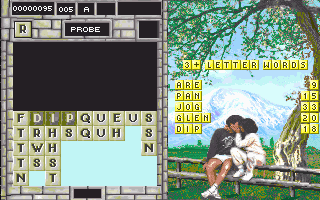All our words through loose using have lost their edge
Ernest Hemingway
Is that a real quote? I don’t know. I learned it from an old videogame, called Wordtris, where it was part of the copy protection. Wordtris was a tetris-like game, where you were given letters and you were rewarded for spelling dictionary words. You had descending letters, and, as of games of the early 90s, Wordtris relied on a copy protection system, where to start the game, you had to provide some information that was available in the manual.
Wordrtris, being a game about fancy words and knowing words, made its information quotes from a variety of sources about words. There are quotes from this game’s copy protection that linger with me even now, particularly the paper burns, but the words fly away, an idea that has given me hope about ideas outlasting materials.
The lasting quote, however, is this Hemingway one. Which I cannot attribute, though I can find a host of sources saying ‘Hemingway said this.’ Is that true? Don’t know. Not a big Hemingway guy.

The anxiety of the phrase is interesting to me. It speaks of a way of using words that wants those words to have an edge; a comparison to a knife, a dagger, a sword, an invocation of a duelist or a knight, in the age of elephant hunters. A man who killed with a gun who bemoaned that he couldn’t use his words like a sword. A disdain for ‘loose using’ of language, of words ‘losing’ something by being used.
I think about this a lot when I think about the phrase I love you.
I used to think that my ability to hold back on that phrase, the idea of holding onto it until I really meant it, could be powerful. That I need not tell people around me that I loved them, because if I did that, it would be more like an immensely powerful thing when they finally heard me use it. And this is something that holds for storytellers! A character who says I love you once is able to deploy it like a sniper’s shot in the narrative, a single turning point.
But we live more complicated stories.

I tell my friends I love them. Often every day. There are friends of mine who I will, very specifically tell them. It is a habit. I have made it work to make it a habit. And it is a habit I have had to cultivate.
The idea of wielding this phrase like a dagger seems to me to be a work of cowardice. Our words are not weapons, not hunter’s tools, they do not flense and stab. They can be wielded that way, but time has taught me that the idea of words as weapons is always going to be most effective probing at places that are already exposed. More than that, though, is that our words are brushes and rollers and the way we use them colours the world around us.
I want to live in a world where my friends know I love them. That it is not easier for me to love a sandwich than love them.
And it’s okay if they have a hard time saying it in return.
1 Trackback